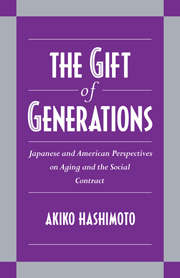Book contents
- Frontmatter
- Contents
- List of Tables and Figure
- Preface
- Acknowledgments
- 1 The Social Designation of Deserving Citizens
- 2 Two Communities, Two Societies
- 3 Rights and Responsibilities in the Public Domain
- 4 The Practice of Protection and Intervention in the Private Domain
- 5 The Japanese Viewpoint
- 6 The American Viewpoint
- 7 Cultural Assumptions and Values
- 8 The Social Regulation of Interests
- 9 Conclusion
- Appendix: Methods of Research
- Bibliography
- Index
2 - Two Communities, Two Societies
Published online by Cambridge University Press: 03 February 2010
- Frontmatter
- Contents
- List of Tables and Figure
- Preface
- Acknowledgments
- 1 The Social Designation of Deserving Citizens
- 2 Two Communities, Two Societies
- 3 Rights and Responsibilities in the Public Domain
- 4 The Practice of Protection and Intervention in the Private Domain
- 5 The Japanese Viewpoint
- 6 The American Viewpoint
- 7 Cultural Assumptions and Values
- 8 The Social Regulation of Interests
- 9 Conclusion
- Appendix: Methods of Research
- Bibliography
- Index
Summary
This street was the busiest around here, but now all business is gone to Station Plaza. … Land Reform even changed the name of this place.
- Shimada Toshio (67), former company employeeWhen older people talk about their past, one is immediately struck by the broad range of history they have witnessed in their lifetimes. The elderly provide a special fascination, because their retrospective accounts of the past often point to continuities and changes that lead to the present and also project into the future. In this sense, the elderly are historians, and in some ways they act as the barometer of social change. Their individual responses to change usually encompass a range of feelings and thoughts that relate to satisfaction with their present lives. In this study, the Japanese elderly often noted a sense of progress and social change, referring to new production technologies and household conveniences that have become widely available. The American elderly, in general, tended to express nostalgia for the past, some sense of loss, and a concern that new values represented something of a decline.
This sense of change must be understood within the contexts of the history and the community characteristics of West Haven and Odawara, which this chapter illustrates. The changes that each community has encountered – new job opportunities, residential options, modern life-styles – have influenced the social relations and support networks of the elderly and represent the background in which their helping arrangements are forged.
- Type
- Chapter
- Information
- The Gift of GenerationsJapanese and American Perspectives on Aging and the Social Contract, pp. 18 - 33Publisher: Cambridge University PressPrint publication year: 1996

